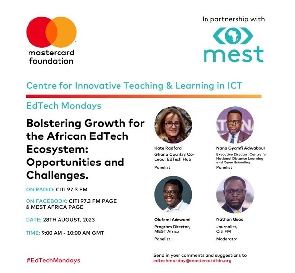In the rapidly evolving landscape of startups and technology in Africa, the African EdTech ecosystem is poised for transformative growth. The E-learning industry alone is projected to grow at a Compound Annual Growth Rate (CAGR) of 39.10% between 2023 and 2028.
According to GSV Ventures, a multi-stage venture capital firm focused on the global education and workforce skills sector, investment in EdTech across the continent is expected to grow from over $3bn in 2021 to $57bn in 2030.
For the August installment of EdTech Mondays, we took a deeper look at the opportunities and challenges within Ghana’s education technology landscape. Guided by host Nathan Quao of CitiFM, industry experts Olufemi Adewumi, Programs Director at MEST Africa (MEST); Nana Gyamfi Adwabour, Executive Director, Centre for National Distance Learning and Open Schooling (CENDLOS), and Kate Radford, Ghana Country Co-Lead for EdTech Hub collectively dissected the current state of EdTech in Ghana. Together, they highlighted significant advancements and underscored the sector's potential to drive innovation, attract investment, and foster lasting, positive change.
The discussion revolved around three main points; Ghana's EdTech landscape in comparison to other African nations, the valuable insights to be gleaned from neighboring ecosystems, and the strategic application of these lessons to harness the potential of and advance Ghana's EdTech industry.
Kate Radford emphasized the importance of encouraging educators to embrace innovative technological solutions by cultivating trust across the educational spectrum. She commended the Ministry of Education for its efforts in enhancing the capacities of Ghanaian learners and educators, encompassing both public servants and EdTech stakeholders, thereby nurturing sustainability within the sector.
She applauded the Ministry's commitment to the use of open-source educational resources, fostering adaptability by drawing inspiration from successful international practices.
Detailing two interventions that Ghana implemented in response to the disruptions caused by COVID-19, particularly in the context of traditional classroom learning, Nana Gyamfi of CENDLOS shed light on some of the country's innovative EdTech initiatives. During the pandemic, CENDLOS introduced the IBox and the ICampus (IC). The IBox is an offline learning management system, and the ICampus (IC) represents its software counterpart.
These innovations facilitated seamless access to educational content for students and streamlined teaching for educators. This addressed and reduced the accessibility gap, a testament to Ghana's commitment to improving learner outcomes through EdTech.
Olufemi Adewumi passionately implored industry stakeholders to undergo a paradigm shift and actively partake in problem-solving ventures. “It is imperative that we shift our focus away from being passive recipients of solutions and instead actively engage as architects of resolutions”.
"I would like to challenge parents,” he continued. “A myriad of technological solutions are readily accessible; platforms like YouTube host Ghanaian content, educating in the field of mathematics. Numerous Ghanaian tech startups and applications may be found on the Google Play Store and the Apple App Store. It is incumbent on parents to seize the initiative and embrace these valuable resources. I implore them to download applications such as eCampus, the Scribble Works app, and other pivotal applications that will undeniably benefit their children."
General News of Friday, 22 September 2023
Source: MEST
Unlocking Potential: Navigating the opportunities and challenges in the Ghanaian EdTech ecosystem
Entertainment
















